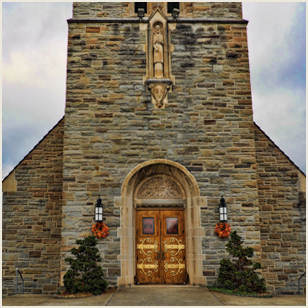Page: Quotes, Quote Topic, Spiritual (life)
Some people by the word freedom understand the ability to do whatever one wants … People who have the more allowed themselves to come into slavery to sins, passions, and defilements more often than others appear as zealots of external freedom, wanting to broaden the laws as much as possible. But such a man uses external freedom only to more severely burden himself with inner slavery. True freedom is the active ability of a man who is not enslaved to sin, who is not pricked by a condemning conscience, to choose the better in the light of God’s truth, and to bring it into actuality with the help of the gracious power of God. This is the freedom of which neither heaven nor earth are restrict.
–Saint Philaret of Moscow (1782-1867)
Love, Page: Quotes, Quote Topic
How beautiful it is that the second human being was taken from the side of the first, so that nature might teach that human beings are equal and, as it were, collateral, and that there is in human affairs neither a superior or an inferior, a characteristic of true friendship.
–Saint Aelred of Rievaulx (1110-1167)
Page: Quotes, Quote Topic, Spiritual (life)
And so in friendship are joined honor and charm, truth and joy, sweetness and good-will, affection and action. And all these take their beginning from Christ, advance through Christ, and are perfected in Christ. Therefore, not too steep or unnatural does the ascent appear from Christ, as the inspiration of the love by which we love our friend, to Christ giving himself to us as our Friend for us to love, so that charm may follow upon charm sweetness upon sweetness and affection upon affection. And thus, friend cleaving to friend in the spirit of Christ, is made with Christ but one heart and one soul, and so mounting aloft through degrees of love to friendship with Christ, he is made one spirit with him.
— Saint Aelred of Rievaulx 1110-1167)
Cross, Page: Quotes, Quote Topic
You should continually keep in mind the great humiliation which the Lord took upon Himself in His ineffable love for us: how the divine Logos dwelt in a womb; how He took human nature upon Himself; His birth from a woman; His gradual bodily growth; the shame He suffered, the insults the vilification, ridicule and abuse; how He was scourged and spat upon, derided and mocked; the scarlet robe, the crown of thorns; His condemnation by those in power; the outcry of the unruly Jews, men of His own race, against Him: ‘Away with him, away with him, crucify him’ (Jn. 19:15); the cross, the nails, the lance, the drink of vinegar and gall; the scorn of the Gentiles; the derision of the passers-by who said: ‘If you are the Son of God, come down from the cross and we will believe you’ (cf. Mt. 27:39-42); and the rest of the sufferings which He patiently accepted for us: crucifixion; death; the three-day burial; the descent into hell. Then keep in mind all that has come from these sufferings. See to what a height of glory the Lord’s human nature was raised up by God’s justice through these sufferings and humiliations.
–Saint Mark the Ascetic (Fifth Century)
Page: Quotes, Prayers for Repentance, Quote Topic
Accept the risen Jesus into your life. Even if you have been far away, take a small step towards Him. He awaits you with open arms.
— Pope Francis (1936-
Page: Quotes, Quote Topic, Spiritual (life)
The more you devote yourself to study of the sacred utterances, the richer will be your understanding of them, just as the more the soil is tilled, the richer the harvest.
–Saint Isidore of Seville (c. 560-636)

